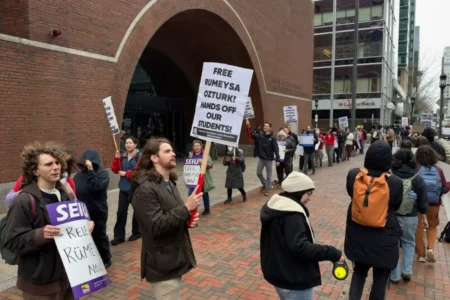Indian Students: In the quiet academic corridors of a prestigious university in Connecticut, a storm is brewing for a 31-year-old PhD scholar from India. Once promised five years of fully funded doctoral study, the scholar has found himself abruptly cut off, with no funding, no safety net, and increasingly, no sleep.
Just two weeks ago, he was informed by the university administration that his monthly stipend of $2,600 would end in May, despite earlier assurances of support through the duration of his PhD program.
“I’m languishing,” he says, exhaustion and anxiety evident in his voice. “I haven’t even told my family in India. They’ll worry too much. I’m just trying to survive.”
What changed? The scholar suspects it might be linked to his past writings in support of the pro-Palestine movement. “I didn’t protest. I wasn’t out there with placards. All I did was write a few articles in 2023—thoughtful, academic pieces—for a couple of publications. And now I feel I’m being targeted.”
Indian Students: A Growing Trend of Quiet Expulsions
His story is not an isolated one. A growing number of Indian students across the U.S. have reported sudden funding cuts, rescinded job offers, and even visa revocations — often stemming from minor infractions or past legal issues they say were already resolved.
Several students, speaking to The Indian Express under the condition of anonymity, shared accounts of SEVIS (Student and Exchange Visitor Information System) terminations. A terminated SEVIS record triggers an immediate loss of legal student status, potentially leading to deportation. These terminations are frequently paired with emails from the U.S. Department of Homeland Security (DHS), notifying students that their immigration status is under review or has been revoked.
The Shadow of Surveillance
The SEVIS database, maintained by the DHS, acts as a digital lifeline for international students. Any change in academic, legal, or immigration status must be reported to it. Once terminated, the database alerts Immigration and Customs Enforcement (ICE), prompting agents to confirm the student’s departure or to begin deportation procedures.
“I’ve already tried applying to universities in other countries,” says the Connecticut PhD student. “Two have rejected me. It’s nearly impossible to transfer now, especially with admissions closed. I feel like I’m running out of time and options.”
His concerns are echoed by others, including a computer science graduate in Texas whose visa was revoked despite a DUI charge being dismissed. “It was my first offense. I completed a diversion program, did everything the court asked. I was even on my STEM OPT, which was valid until 2026. Then, one day, I get an email saying my authorization is canceled and my visa is revoked.”
Political Pressure and Punitive Measures
Last month, U.S. Secretary of State Marco Rubio commented on the revocation of over 300 foreign student visas, stating: “We gave you a visa to come and study and get a degree, not to become a social activist that tears up our university campuses.”
This blanket statement has sent a chill through international academic communities, particularly among Indian students, the largest group of international scholars in the U.S., with 331,000 enrolled in the 2023–24 academic year according to Open Doors data.
The PhD student in Connecticut says he now lives in fear — not just of being deported, but of being forgotten. “I came here with dreams. I worked hard, earned this scholarship, gave up everything back home. And now, I feel discarded — as if I never mattered.”
A Community in Limbo
For many international students, education in the U.S. is more than a degree — it’s a life plan. The investment, both emotional and financial, is staggering. The uncertainty surrounding their legal status has left many in a state of limbo, afraid to speak out or seek help.
Human rights organizations and academic freedom watchdogs have raised alarms about the chilling effect such crackdowns could have on intellectual discourse. “When students are punished for peaceful expression — especially through academic writing — it raises fundamental questions about freedom of speech and academic integrity in U.S. institutions,” says a representative from Scholars at Risk, an international network supporting threatened academics.
The Human Cost
For now, the scholar in Connecticut is focused on basic survival — applying for part-time work, borrowing from friends, and scanning visa regulations for loopholes. But his sleep remains elusive.
“When I wake up, the first thing I do is check my email, afraid of more bad news. When I sleep, I dream of being sent back, of disappointing my parents. I just want a chance to finish what I came here to do.”
Also Read : Pan Nalin: The Visionary Storyteller of Modern Indian Cinema
